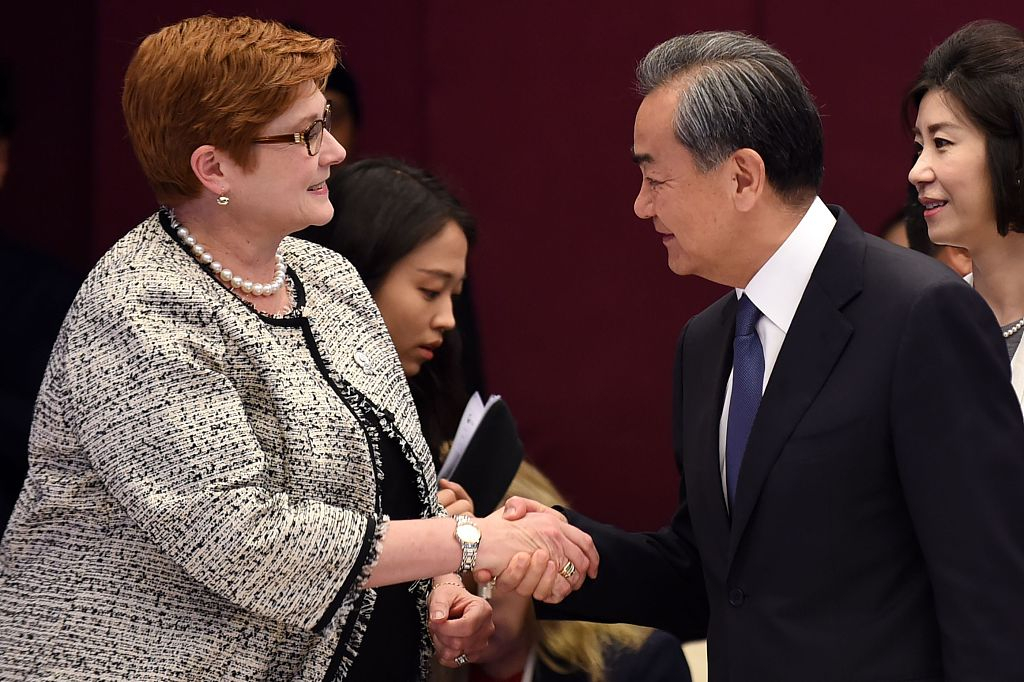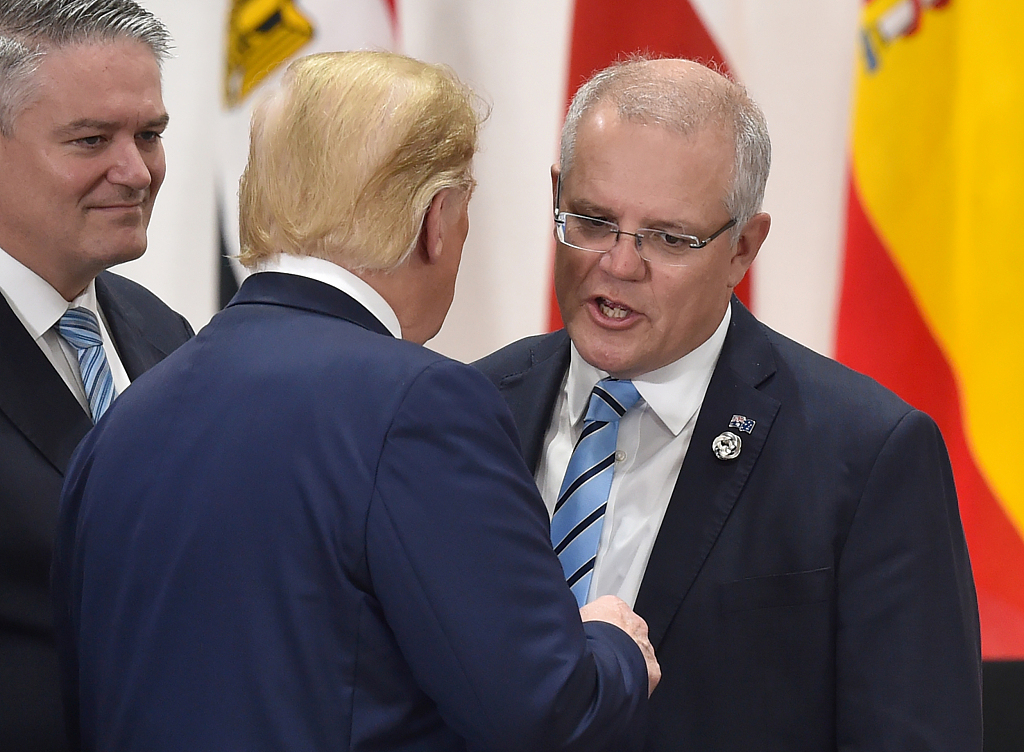
Editor's note: Steen Andersen is a freelancer based in Australia who writes about Chinese history and the world's political, social, and environmental problems. The article reflects the author's opinions, and not necessarily the views of CGTN.
In Australia since the publication of "Silent Invasion" by Clive Hamilton in early 2018, the media has been hysterical about "foreign interference" with nearly all the activities being aimed at Chinese interference and many of our politicians have added to this hysteria. What is the difference between "foreign influence" and "foreign interference"?
As far as I can tell, the dictionary definitions are similar but the media usage of these terms seem to imply that the former applies when our politicians are agreeable to the ideas but the latter applies when our politicians look unfavorably on the ideas.
The general trend in our media and from our politicians seems to be that the U.S. influences Australia but China interferes with Australia. The U.S. influence is treated as benign while Chinese interference is treated as a threat.
Australia has passed into law the following bills, namely the National Security Legislation Amendment (Espionage and Foreign Interference) Act 2018 and Foreign Influence Transparency Scheme Act 2018, which seem to have two purposes in relation to ideas originating from or supporting China.
Firstly, to make it very easy for our politicians to identify ideas from China, because all ideas expressed by a registered foreign agent are identified so under the present anti-China attitude can be ignored without a rational consideration of their validity. Other ideas by non-registered foreign agents will automatically be restricted in number because people will be afraid of committing an offense under the bill.

Australian Foreign Minister Marise Payne (L) shakes hands with Chinese Foreign Minister Wang Yi during the East Asia Summit Foreign Ministers' Meeting on the sidelines of the 52nd Association of Southeast Asian Nations Foreign Ministers' Meeting in Bangkok, Thailand, August 2, 2019. /VCG Photo
Australian Foreign Minister Marise Payne (L) shakes hands with Chinese Foreign Minister Wang Yi during the East Asia Summit Foreign Ministers' Meeting on the sidelines of the 52nd Association of Southeast Asian Nations Foreign Ministers' Meeting in Bangkok, Thailand, August 2, 2019. /VCG Photo
This means that politicians will greatly reduce the number of foreign ideas they are exposed to and the necessity of having to weigh the pros and cons of such ideas and thereby reducing the danger of being subjected to ideas highlighting the shortcomings of Western democracy.
Secondly, these laws will help to protect the existing Western style of democracy from any questioning of its efficiency and thus help to protect the system that has been highly successful in gaining an advantage for the rich 1 percent of the population and their political protectors to the disadvantage of the rest of the population.
The idea that our present government is trying to exclude ideas originating in China is backed up by the New South Wales Department of Education deciding to ban Confucius Institutes from high schools. The banning of Huawei from rolling out 5G mobile infrastructure in Australia and the federal government's refusal to consider joining the Belt and Road Initiative (probably at the suggestion of the U.S.) also indicate the refusal to consider Chinese ideas.
But in fact, Chinese ideas have brought a lot of fruitful results. In Xinjiang, there have been no terrorist activities in almost three years as a result of policies adopted by the Chinese government. These policies, in addition to increase in security precautions, include setting up vocational education training centers where minor offenders are given education and training in de-radicalization, the Chinese language, Chinese laws etc. and also taught job skills to help them gain a better future.
The Chinese government has also worked to create more job opportunities through the Belt and Road Initiative, developing tourism, and other poverty alleviation activities. The success of these policies should be applauded and learned by other countries but the Western world has set up a massive campaign to categorize these activities as human rights abuses. Why apart from general "China Bashing" is this so?

Australian Prime Minister Scott Morrison (R) chats with U.S. President Donald Trump (C) prior to the session 3 on women's workforce participation, future of work, and aging societies at the G20 Summit in Osaka, Japan, June 29, 2019. /VCG Photo
Australian Prime Minister Scott Morrison (R) chats with U.S. President Donald Trump (C) prior to the session 3 on women's workforce participation, future of work, and aging societies at the G20 Summit in Osaka, Japan, June 29, 2019. /VCG Photo
Just consider what would happen if countries across North Africa, the Middle East and Afghanistan successfully used these Chinese ideas to treat their own terrorist problems. It could possibly result in peace in the region, but would be a disaster for the American, Australian and British armament industries. It might even make these countries lose their control of the oil in some of these areas.
When you look at the present dysfunctional governments in the U.S., UK and Australia, can any rational human being, apart from those mentioned above who obviously benefit from the present system, honestly say that democracy is working perfectly and that there is no need to consider any changes to improve the system?
Obviously the present U.S. administration is busy blaming China for all America's problems and absolutely refusing to analyze what could be done domestically to solve these problems, most of which are caused by America's own domestic and foreign policies. It is so much easier to blame others and if it seems possible that you can destroy a competitor at the same time, then that is the seemingly perfect solution. Hence the trade and technology war with China.
In the last few years, China's technological development has been outstanding due to the vast sums of money being plowed into research and development and the improvement in China's education system. America and Australia's attempt to exclude or restrict students and researchers from China on the basis of "security considerations" will again reduce the flow of knowledge available to these countries and affect their development.
In 1793, Lord George Macartney wrote "China's opposition to British goals was ultimately futile, since it was in vain to attempt arresting the progress of human knowledge as the Qing were doing. The human mind is of a soaring nature and having once gained the lower steps of the ascent struggles incessantly against every difficulty to reach the highest."
This observation is good advice for both Washington and Canberra. Is it now the U.S.' turn to suffer the same fate and will Australia follow the U.S.?
(If you want to contribute and have specific expertise, please contact us at opinions@cgtn.com.)